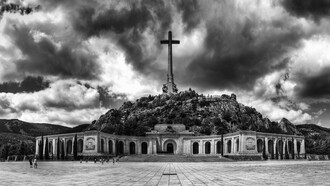In their eagerness to fulfil survival needs and achieve goals that bring peace of mind—a state which is generally experienced as not having problems—human beings adapt to what is around them, even if it annihilates them as individuals. This is a process of submission to what mistreats, often the only way to survive. It's all about survival, living at any cost, ignoring others and the principles of life itself.
This is what happens, for example, when an individual becomes an active member of a dictatorial or authoritarian system. On a daily basis, they dedicate themselves to perceiving the other as an enemy pest so that, by collecting scalps and satisfying the authorities, they can be promoted, be the boss's right-hand man, be well-placed in the system that tortures and kills. We find this attitude in everything from simple everyday situations to serious and far-reaching ones.
In Nazism, at the time of Hitler, these situations were more than frequent. Being involved in actions that resulted in destruction, in denouncing, was for these people the way to triumph, to win in life, and to succeed. Adapting to dehumanising atrocities was a way of surviving. They thought of their daily lives as situations in which they had to choose between killing or dying.
When the limits of existence and coexistence are reduced to opposites, to antonyms, to reason and unreason, behaviour becomes characterised by adapting or dying. This is the law of the murderous gangs, it's the rule of killing and killing, it's the adaptation that allows them to survive without question, that is, without challenge, controversy or polemic.
In the midst of the world's diversity, the colourful customs and nations, sometimes there's no room left. Putting your foot down is only possible if the space isn't occupied by another foot. These overlaps force us to fight and dispute. When you don't realise the reducing forces that have diminished the space, you fight to occupy the minimum, instead of trying to confront the reducers of it. In these experiences, what is sought is to kill so as not to die, to adapt so as not to give in, without realising that this process is already deadly and maladaptive.
However, we must remember that the other is our neighbour, our fellow human being. Often they are covered up, hidden by labels that read: this is a stranger, this is harmful, this is bad. When you see an action, when you see a movement of that which is wrapped up and presented in this way, you kill the other, you promote the anticipated destruction of the human, thus creating scapegoats for your own actions, creating enemies, those who must be rejected.
By adapting to seeing everything through existing labels, through discriminatory standards, hordes are created, “armies of salvation”, flocks adapted and controlled by leaders who only wish to reign, to rule, to have power. The end result of this process is the encounter of situations that should not be survived when a minimum of lucidity and questioning prevails, or even those comfortable, adaptive situations that cause depression, death, and dehumanisation.
Jean Cocteau described these situations very well: "Environments that are too diverse are harmful to the sensitive that adapts. Once upon a time, there was a chameleon. To keep it warm, its owner placed it on a colourful Scottish blanket. The chameleon died of fatigue." With so much mimicry, in the diversity of colours, it has exhausted its possibilities—it has died. To stop being who you are, to stop believing what you believe in order to be accepted or to survive, is a quick way to be destroyed and depersonalised.














